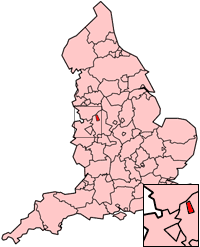
Onomatopoeia is the use or creation of a word that phonetically imitates, resembles, or suggests the sound that it describes. Such a word itself is also called an onomatopoeia. Common onomatopoeias include animal noises such as oink, meow, roar, and chirp. Onomatopoeia can differ by language: it conforms to some extent to the broader linguistic system; hence the sound of a clock may be expressed as tick tock in English, tic tac in Spanish and Italian, dī dā in Mandarin, kachi kachi in Japanese, or tik-tik in Hindi.

Igbo is the principal native language cluster of the Igbo people, an ancient ethnicity in the Southern Eastern part of Nigeria.

Geordie is a nickname for a person from the Tyneside area of North East England and the dialect used by its inhabitants, also known in linguistics as Tyneside English or Newcastle English. There are different definitions of what constitutes a Geordie. The term is used and has been historically used to refer to the people of the North East. A Geordie can also specifically be a native of Tyneside and the surrounding areas. Not everyone from the North East of England identifies as a Geordie.

Pussy is a term used as a noun, an adjective, and—in rare instances—a verb in the English language. It has several meanings, as slang, as euphemism, and as vulgarity. The most common as a noun, it means "cat", as well as "coward or weakling". In slang usage, it can mean "vulva or vagina" and less commonly, as a form of synecdoche, meaning "sexual intercourse with a woman". Because of its multiple senses including both innocent and vulgar connotations, pussy is often the subject of double entendre.
The phonology of the open back vowels of the English language has undergone changes both overall and with regional variations, through Old and Middle English to the present. The sounds heard in modern English were significantly influenced by the Great Vowel Shift, as well as more recent developments in some dialects such as the cot–caught merger.
The Brummie dialect, or more formally the Birmingham dialect, is spoken by many people in Birmingham, England, and some of its surrounding area. "Brummie" is also a demonym for people from Birmingham. It is often erroneously used in referring to all accents of the West Midlands, as it is markedly distinct from the traditional accent of the adjacent Black Country, but modern-day population mobility has tended to blur the distinction. Population mobility has meant that to a degree, the Brummie accent extends into some parts of the Metropolitan Borough of Solihull, but much of the accent within the borough might be considered to be closer to contemporary Received Pronunciation (RP).
Initial-stress derivation is a phonological process in English that moves stress to the first syllable of verbs when they are used as nouns or adjectives. This process can be found in the case of several dozen verb-noun and verb-adjective pairs and is gradually becoming more standardized in some English dialects, but it is not present in all. The list of affected words differs from area to area, and often depends on whether a word is used metaphorically or not. At least 170 verb-noun or verb-adjective pairs exist. Some examples are:

The Norfolk dialect, also known as Broad Norfolk, is a dialect spoken in the county of Norfolk in England which sits within the broader East Anglian English. While less widely and purely spoken than in its heyday, the dialect and vocabulary can still be heard across the county, with some variations. It employs distinctively unique pronunciations, especially of vowels; and consistent grammatical forms that differ markedly from standard English.
Etymology is the scientific study of the origin and evolution of a word's semantic meaning across time, including its constituent morphemes and phonemes. It is a subfield of historical linguistics, philology, and semiotics, and draws upon comparative semantics, morphology, pragmatics, and phonetics in order to construct a comprehensive and chronological catalogue of all meanings that a morpheme, phoneme, word, or sign has carried across time.
Folk etymology is a change in a word or phrase resulting from the replacement of an unfamiliar form by a more familiar one through popular usage. The form or the meaning of an archaic, foreign, or otherwise unfamiliar word is reinterpreted as resembling more familiar words or morphemes.

The Ivatan language, also known as Chirin nu Ivatan, is a Philippine language of Austronesian origins spoken in the Batanes Islands of the Philippines.

East Anglian English is a dialect of English spoken in East Anglia, primarily in or before the mid-20th century. East Anglian English has had a very considerable input into modern Estuary English. However, it has received little attention from the media and is not easily recognised by people from other parts of the United Kingdom. East Anglia is not easily defined and its boundaries are not uniformly agreed upon.

English in Southern England is the collective set of different dialects and accents of Modern English spoken in Southern England.

Potteries is an English dialect of the West Midlands of England, almost exclusively in and around Stoke-on-Trent, Staffordshire.

The English word god comes from the Old English god, which itself is derived from the Proto-Germanic *gudą. Its cognates in other Germanic languages include guþ, gudis, guð, god, and got.
Many words that existed in Old English did not survive into Modern English. There are also many words in Modern English that bear little or no resemblance in meaning to their Old English etymons. Some linguists estimate that as much as 80 percent of the lexicon of Old English was lost by the end of the Middle English period, including many compound words, e.g. bōchūs, yet the components 'book' and 'house' were kept. Certain categories of words seem to have been more susceptible. Nearly all words relating to sexual intercourse and sexual organs as well as "impolite" words for bodily functions were ignored in favor of words borrowed from Latin or Ancient Greek. The Old English synonyms are now mostly either extinct or considered crude or vulgar, such as arse/ass.
Nesh is an English dialect adjective meaning 'unusually susceptible to cold weather' and there is no synonym for this use. The Oxford English Dictionary defines the word as: "Soft in texture or consistency; yielding easily to pressure or force. In later use chiefly: tender, succulent, juicy."
The following is a list of words and formulations commonly used as profanity throughout Romania.
Present-day Irish has numerous loanwords from English. The native term for these is béarlachas, from Béarla, the Irish word for the English language. It is a result of bilingualism within a society where there is a dominant, superstrate language and a minority substrate language with few or no monolingual speakers and a perceived "lesser" status.

Maldivian, also known by its endonym Dhivehi or Divehi, is an Indo-Aryan language spoken in the South Asian island country of Maldives and on Minicoy Island, Lakshadweep, a union territory of India.










